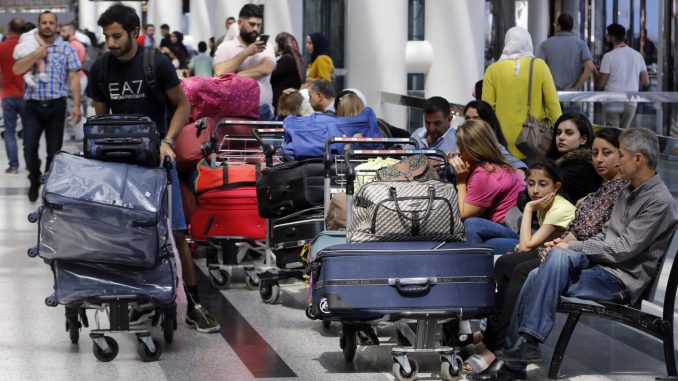
Feeling suffocated by an unprecedented economic crisis, an increasing number of Lebanese nationals are abandoning their home country for Africa.
In Nabatieh, the largest city in southern Lebanon, Mohammed Patrice Reda is waiting for his visa for Côte d’Ivoire to come through. The 24-year-old always dreamed of becoming an engineer but never imagined he would have to travel thousands of kilometres to land his first job in the field.
“Right after I got my degree, I began applying for jobs in Lebanon, but I only found unpaid internships. I did three of those, but none of the companies hired me afterwards. The more I job hunt, the more I realise the economic situation is unsustainable.”
Côte d’Ivoire, Nigeria and Senegal
The third most indebted nation in the world, Lebanon is currently experiencing the worst economic crisis in its history. In the span of a few months, the Lebanese pound lost 60% of its value, setting off a seemingly unstoppable spiral of hyperinflation. Wages are hardly worth anything and workers are falling into poverty at breakneck speed. According to the United Nations, the number of people unable to meet their basic needs – such as having adequate food – doubled in 2020 to 55% of the population.
Amid the chaos, there is no way of knowing exactly how many Lebanese citizens are packing their bags, but one thing is certain: many of them are moving abroad. And it isn’t a new phenomenon. With the Lebanese people fleeing massacres and wars since the 19th century, the country has one of the largest diaspora communities in the world, totalling around 12 million people, i.e., four times its population. Out of this group, a few hundred thousand people – many of whom hail from southern Lebanon – have moved to Africa, especially Côte d’Ivoire, Nigeria and Senegal.
As the pandemic and economic recession rage on, Lebanese emigration to African countries is easier than making the leap to Europe or the United States since air travel to the continent is up and running. What’s more, in most cases in Africa the only document needed to obtain a visa is an invitation letter from a relative living in the destination country.
Mohamed’s father already lives in Abidjan, where he owns a bakery. “I’ve never been to Côte d’Ivoire before but I’m sure that life is better there compared to here. I’ve done a lot of research on the internet and I hope I’ll meet some Lebanese people once I’m there. I’m looking forward to starting my career and building my life… I have a lot of dreams,” says Mohamed. In the meantime, he is volunteering at a local NGO which distributes food parcels to the families hit hardest by the crisis.
Towns reliant on money from abroad
Most Lebanese nationals stay in Africa for good once they move. A great many of them obtain citizenship in their host country and learn the local language, while continuing to send money to their loved ones back in Lebanon, where public services are sorely lacking. In the southern part of the country, the economy of dozens of towns is fully reliant on such money transfers.
Zrarieh, located 65 kilometres south of Beirut, is a textbook example of this dependency. Officially speaking, the town has a population of 15,000. But, in reality, more than a third of its residents live in Côte d’Ivoire. In 2015, the town’s main road was even renamed “Abidjan Avenue”. “The town’s entire economy is based on immigration. Young people here grow up with the idea that their cousins in Abidjan are richer than them. Women go there to help their husbands. In a way, it’s a vicious cycle,” says the mayor’s wife, Dalida Jezzini. Born in Senegal, she is one of just a few to have emigrated in the opposite direction. “Out of patriotism,” she says.

There was a time when money flowing from Africa was used to build luxury villas. But now with the crisis in full swing, the entire town is reliant on money from abroad. To prevent whole families from sinking into poverty, Lebanon’s Abidjan-based diaspora community have sent some $100,000 back home in recent months. The town’s mayor, Adnan Jezzini, consolidated and redistributed the funds to around 1,000 needy families. “The money covers their daily expenses, medications, hospital bills, education costs, etc.,” he says.
Monitored money transfers
Sending money isn’t easy. Before the crisis, members of the diaspora funnelled some of their money through the traditional financial system. But over the past year, Lebanese banks have been limiting cash withdrawals to just a few hundred euros per month. Though money transfer agencies are still open for business, there is no trace of this valuable financial assistance at the Western Union branch in Zrarieh.
To get around commission fees, cash-filled suitcases are brought into Lebanon.
Branch head Ali Hachem -who himself spent 10 years in Abidjan working at a plastics plant until he contracted malaria – is the recipient of a certain number of transfers. But the vast majority of money flooding into the country arrives in the form of cash. “To get around commission fees, cash-filled suitcases are brought into Lebanon. Everyone uses this system, otherwise we couldn’t keep living here,” he tells us in French with a hint of an Ivorian accent.
Cash has another thing going for it: it’s discreet. In an effort to fight money laundering and the financing of terrorism, financial transactions emanating from the Lebanese diaspora are closely monitored by the international community, with the United States at the head of the pack. Such monitoring is due to the alleged role money transfers play in funding Hezbollah, the powerful Lebanese political party backed by Iran. In Zrarieh, like many a town in southern Lebanon, flags with the emblem of the “Party of God” and its martyred fighters can be seen from the roadside.
A new generation of emigrants
As Lebanon falls deeper into crisis, the African continent is starting to attract citizens from all over the country. After completing a degree in hospitality, Élie was hired as a sales manager for a company in Beirut. But when the value of the Lebanese pound plummeted last July, his $2,300 a month salary became worth no more than $430. “I started to look for other opportunities because there aren’t any openings here. I applied for jobs in many parts of Europe and in the Gulf states. I thought about going to France and maybe Dubai, but I had never considered moving to Africa,” he tells us. The young man ultimately relocated to Algeria, where he now works for a telecommunications company. “I have absolutely no regrets because the situation in Lebanon keeps getting worse,” he says over the phone.
I love Lebanon and I’ll come back to visit when I’m on holiday, but I know my future isn’t here.
In October 2019, young people in Lebanon came out in droves to protest against the country’s culture of political corruption and wasteful government spending. One year on, the nation’s leaders continue to ignore the population’s demands, dashing the hopes of those who believed change was possible.
At Saint Joseph University, one of Beirut’s top educational institutions, a new generation of Lebanese students are getting ready to head to Africa. Khalil Zein, 19, plans to finish his bachelor’s degree in management before trying his luck in Côte d’Ivoire. “Our country doesn’t pay attention to its youth. I love Lebanon and I’ll come back to visit when I’m on holiday, but I know my future isn’t here,” he says.
References: https://en.wikipedia.org/wiki/Lebanese_Civil_War

